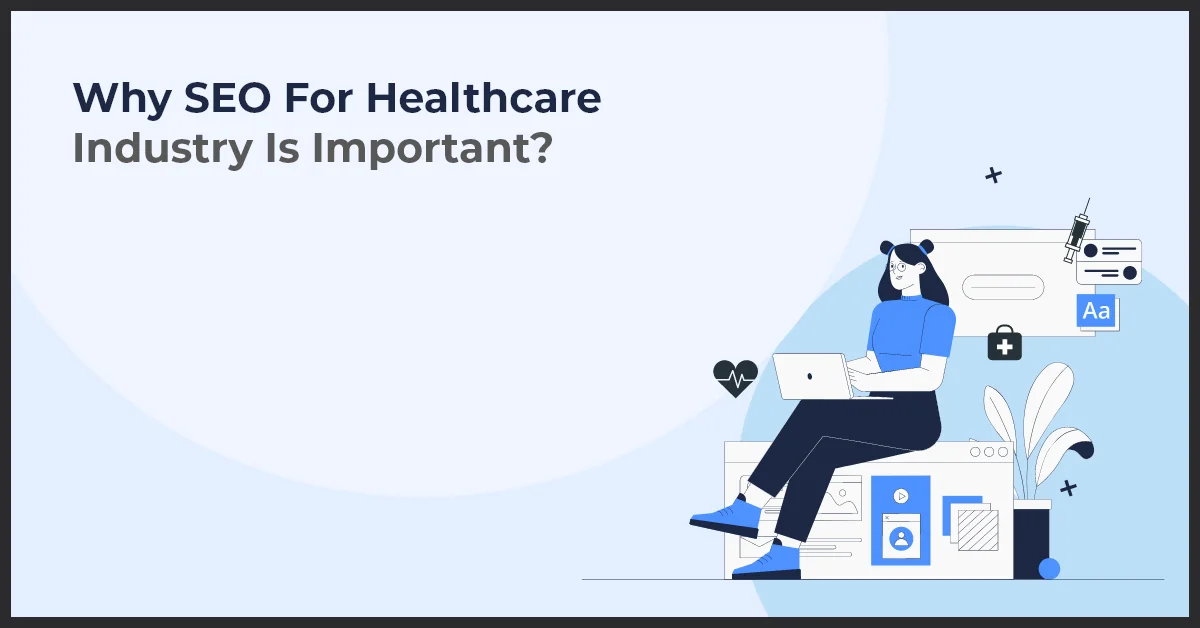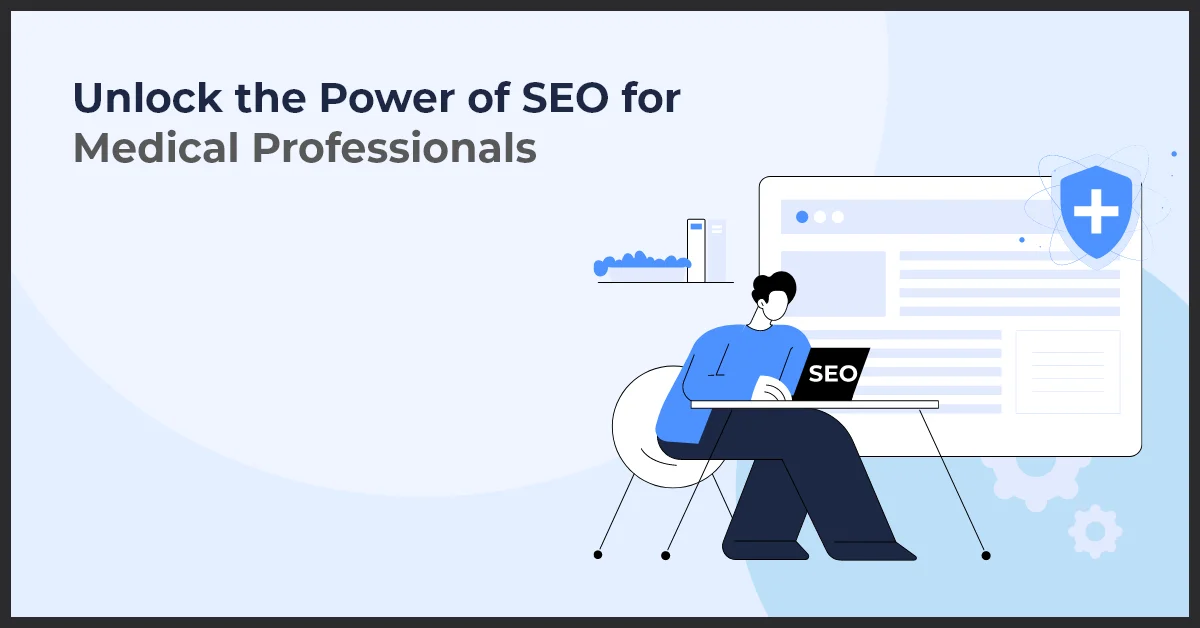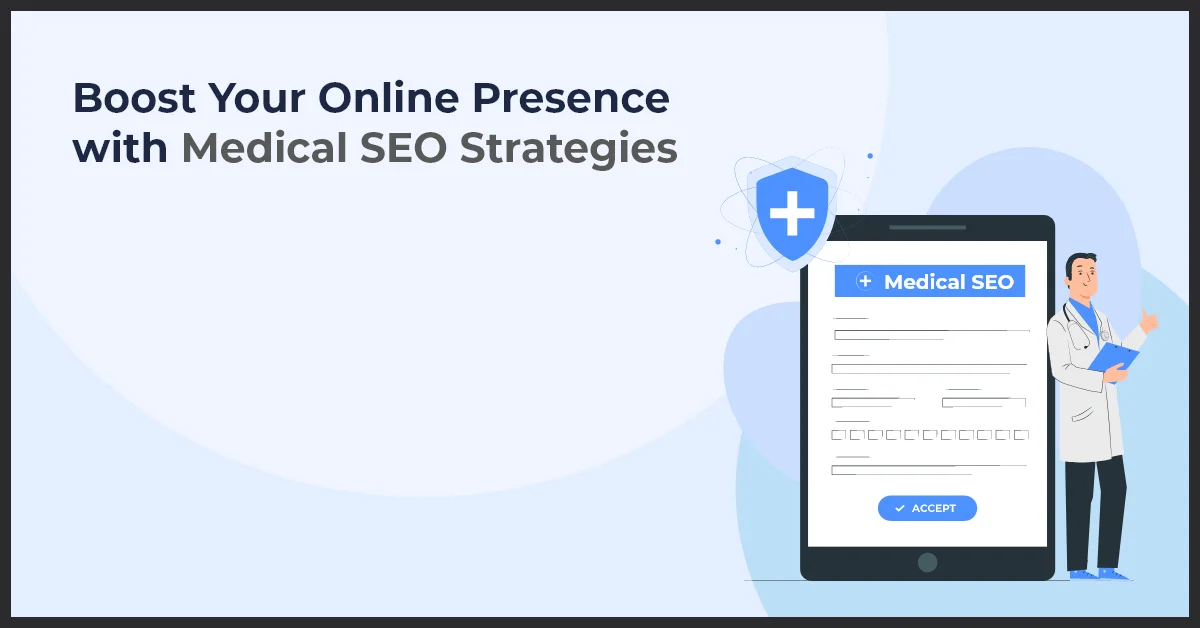Why SEO For Healthcare Industry Is Important?

Published on: August 10, 2024
Updated on: September 02, 2024
1596 Views
- Digital Marketing
9 min read
As a healthcare professional looking to attract more patients to your website, harnessing the power of Search Engine Optimization (SEO) is essential. SEO for Healthcare Industry is crucial for websites to rank higher on search engine results pages, making it easier for patients to find the information they need.
By utilizing SEO strategies such as keyword optimization, content creation, and backlink building, healthcare websites can improve their visibility online and drive more traffic to their site. SEO for Healthcare Industry not only helps in attracting new patients but also establishes credibility and trust among existing patients.
The Significance of SEO in the Healthcare Industry
SEO for Healthcare Industry is crucial for their websites as it helps them rank higher in search engine results pages (SERPs). When patients search for healthcare services online, they are more likely to visit websites that appear at the top of the search results. By implementing SEO strategies, healthcare providers can increase their online visibility and attract more patients to their practice.
How SEO Improves Online Visibility and Attracts Patients
SEO for Healthcare Industry involves optimizing a website's content, structure, and meta tags to make it more search engine friendly. This, in turn, helps healthcare websites rank higher in search results, making them more visible to potential patients. By appearing on the first page of search results, healthcare providers can increase their chances of attracting patients who are actively looking for their services.
The Role of Search Engines in Healthcare Marketing
Search engines, especially Google, play a significant role in healthcare marketing. Patients often turn to search engines to find information about healthcare providers, treatments, and medical conditions. By investing in SEO, healthcare providers can ensure that their website appears at the top of relevant search results, making it easier for patients to find and choose their services.
Key SEO strategies for healthcare websites
When it comes to optimizing your healthcare website for search engines, there are a few key strategies that can help improve your online visibility and attract more patients.
- On-page optimization: Make sure your website is optimized for key search terms related to your healthcare services. This includes optimizing meta tags, headings, and image alt text.
- High-quality content creation: Creating informative and engaging content that is relevant to your target audience is essential for SEO success. Regularly update your website with fresh, valuable content.
- Link building: Building high-quality backlinks from reputable sources can help improve your website's authority and search engine rankings. Consider reaching out to other healthcare websites for link-building opportunities.
- Keyword research: Conduct thorough keyword research to identify healthcare-specific keywords that your target audience is searching for. Use these keywords strategically throughout your website's content.
By implementing these key SEO strategies, you can improve your healthcare website's visibility in search engine results and attract more patients to your practice.
Benefits of SEO for Healthcare Providers
When it comes to running a successful healthcare practice, having a strong online presence is essential. One of the best ways to improve your digital visibility and attract more patients is through SEO for Healthcare Industry.
Here are some key benefits of utilizing SEO for healthcare providers:
- Increased visibility: By optimizing your website for relevant keywords, you can improve your search engine rankings and appear higher in search results, making it easier for potential patients to find you online.
- Higher website traffic: With better visibility comes increased website traffic. SEO for Healthcare Industry helps drive organic traffic to your site, resulting in more opportunities to convert visitors into patients.
- Enhanced credibility and trust: Patients tend to trust websites that appear at the top of search results. By investing in SEO for Healthcare Industry, you can build credibility and establish trust with potential patients.
- Cost-effective marketing: Compared to traditional marketing methods, SEO for Healthcare Industry is a cost-effective way to market your healthcare practice. It allows you to reach a larger audience without breaking the bank.
- Improved user experience: SEO involves optimizing your website for both search engines and users. By providing a seamless user experience, you can keep visitors engaged and encourage them to schedule appointments or seek out your services.
SEO Trends in the Healthcare Industry
Staying up-to-date with the latest SEO trends is crucial for healthcare websites looking to enhance their online visibility and attract more patients.
Let's take a look at some of the current SEO trends in the healthcare industry:
1. Growing Importance of Mobile SEO
Today more and more people are using their smartphones to search for healthcare information and services. This makes mobile SEO a top priority for healthcare websites. Ensuring that your site is mobile-friendly and optimized for mobile search can significantly improve your search engine rankings and drive more traffic to your site.
2. Emerging Trends in Healthcare SEO
As technology continues to advance, new trends in healthcare SEO are constantly emerging. From voice search optimization to local SEO targeting, staying ahead of the curve can give your healthcare website a competitive edge in the search engine results pages.
Common SEO Mistakes to Avoid
When it comes to optimizing your healthcare website for search engines, it's important to avoid common mistakes that can negatively impact your SEO efforts.
Here are some key pitfalls to watch out for:
1. Keyword Stuffing
Keyword stuffing is the practice of overloading your content with keywords in an attempt to manipulate search engine rankings. While it's important to include relevant keywords in SEO for Healthcare Industry, stuffing them into your content can make it unreadable and diminish the user experience. Instead, focus on creating high-quality, valuable content that naturally incorporates keywords.
2. Ignoring Mobile Users
In today's mobile-first world, it's essential to ensure that your healthcare website is optimized for mobile devices. Ignoring mobile users can result in a poor user experience and lower search engine rankings. Make sure your site is responsive and provides a seamless experience across all devices.
3. Neglecting Local SEO
Local SEO is crucial for healthcare practices looking to attract patients in their area. Neglecting local SEO strategies, such as optimizing your Google My Business listing and including location-based keywords in your content, can prevent potential patients from finding your practice online.
Measuring the Success of SEO in Healthcare Industry
As a healthcare provider, it's crucial to understand how well your SEO efforts are performing. Measuring the success of your SEO strategy can help you determine what is working well and what areas need improvement.
Here are some key ways to measure the success of SEO in the healthcare industry:
- Organic Traffic: Monitor the amount of organic traffic coming to your website. An increase in organic traffic can indicate that your SEO efforts are driving more visitors to your site.
- Keyword Rankings: Keep track of the rankings of your targeted healthcare keywords. Seeing improvements in keyword rankings means that your SEO strategy is effective.
- Conversion Rates: Measure the conversion rates of visitors who come to your site through organic search. A higher conversion rate indicates that your SEO efforts are attracting quality leads.
- Click-Through Rates: Analyze the click-through rates of your search engine listings. A high click-through rate shows that your meta titles and descriptions are compelling to users.
- ROI: Calculate the return on investment of your SEO campaigns. A positive ROI means that your SEO efforts are generating revenue for your healthcare business.
There are several tools available for monitoring SEO performance and analyzing data in the healthcare industry. Some popular tools include Google Analytics, SEMrush, Moz, and Ahrefs.
By regularly measuring and analyzing these key metrics, you can gain insights into the effectiveness of your SEO strategy and make data-driven decisions to improve your healthcare website's performance.
SEO Tools for Healthcare Marketing
When it comes to optimizing your healthcare website for search engines, having the right tools at your disposal can make all the difference.
Here are some essential SEO tools that can help elevate your healthcare marketing efforts:
1. Keyword Research Tools
- Google Keyword Planner: This free tool from Google helps you discover relevant keywords for your healthcare niche.
- Semrush: A comprehensive keyword research tool that provides valuable insights into competitor keywords and trends.
2. On-Page Optimization Tools
- Yoast SEO: A popular WordPress plugin that helps optimize on-page content for search engines.
- Screaming Frog: A website crawler tool that helps identify on-page SEO issues and opportunities for improvement.
3. Link Building Tools
- Moz Link Explorer: Allows you to analyze backlinks and identify potential link building opportunities for your healthcare website.
- Ahrefs: Another powerful tool for analyzing backlinks and monitoring your link building efforts.
These SEO tools are specifically tailored to help healthcare websites improve their search engine rankings and attract more organic traffic. By leveraging the right tools, you can stay ahead of the competition and ensure that your healthcare marketing efforts are effective and successful.
Key Takeaways
- Boost Visibility: SEO helps healthcare websites rank higher in search results, making it easier for patients to find them.
- Build Trust: High rankings enhance credibility and trust with potential patients.
- Use Key Strategies: Effective SEO includes on-page optimization, quality content, and link building.
- Focus on Mobile and Local: Ensure your site is mobile-friendly and optimize for local search to attract nearby patients.
- Measure and Adjust: Continuously track metrics like traffic and rankings to refine and improve your SEO efforts.
Conclusion
In the competitive landscape of healthcare, SEO is indispensable for enhancing online visibility and attracting new patients. By optimizing your website through keyword strategies, high-quality content, and effective link-building, you can significantly improve your search engine rankings. This increased visibility not only drives more traffic to your site but also establishes trust and credibility with potential patients.
As you can see, investing in SEO is crucial for healthcare providers to improve their online visibility, attract more patients, and stay ahead of competitors. By optimizing your website with the right keywords, creating high-quality content, and staying updated on SEO trends, you can drive more organic traffic to your site and ultimately grow your practice.
SEO is not a one-time task but an ongoing process that requires constant monitoring and adjustments. By avoiding common SEO mistakes and regularly measuring your SEO success, you can continue to improve your search engine rankings and reach more potential patients.
Don’t wait to make a lasting impression online. Implement top-tier SEO practices today and ensure your future patients find you effortlessly. Partner with Growth Natives to optimize your healthcare content and drive meaningful traffic to your site.
Start your journey to online success now – your next patient is just a search away!
Frequently Asked Questions
- SEO helps healthcare providers improve their online visibility and attract more patients.
- It also helps in positioning healthcare websites at the top of search engine results pages.
- By optimizing their websites for search engines, healthcare providers can reach a larger audience and increase their patient base.
- Creating high-quality, informative content that is relevant to the target audience.
- Optimizing website speed and mobile-friendliness for better user experience.
- Using relevant keywords and optimizing meta tags for search engines.
- Building backlinks from reputable websites in the healthcare industry.
- Tracking website traffic and monitoring changes in search engine rankings.
- Analyzing conversion rates and tracking leads generated through organic search.
- Monitoring social media engagement and user interactions on the website.
- Keyword stuffing and using irrelevant keywords on webpages.
- Ignoring technical SEO aspects like website speed and mobile optimization.
- Neglecting the importance of local SEO for healthcare providers with physical locations.
- Not regularly updating and optimizing website content for search engines.



